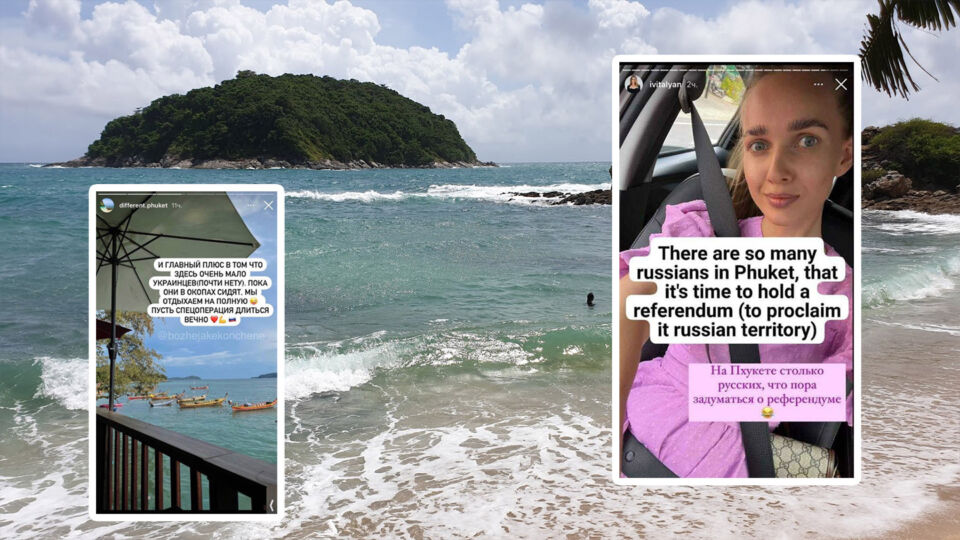Alex was walking back home along Phuket’s Bang Tao Beach in December after watching the World Cup finals when a friend waved him over to the Little Paris restaurant.
He was confused when, after a few minutes of conversation, a female customer at the restaurant that Alex identified as Russian – and visibly drunk – started calling him a Nazi, until she pointed out that his shirt was printed with the emblem of a controversial Ukrainian military unit – a gift he said came from a friend at the Ukrainian Embassy.
“She was telling me that I was wearing a Nazi shirt, that I cannot wear it, that I was killing people,” Alex told Coconuts.
Alex said he associated his shirt’s Azov Regiment badge with Ukraine’s National Guard and did not believe it promoted Nazi ideology. Created in 2014 to fight Russian forces, the group was founded by far-right figures with neo-nazi views and designated a terrorist group by Moscow in August. Ukraine says the decorated unit fighting in its defense has been purged of its ideological origins.
Nazi or not, Azov has played a key role in Russian propaganda justifying its invasion, and other guests at Little Paris were not happy about Alex’s shirt.
“Then suddenly, a couple of guys began hitting me in the back of my head,” he said.
Alex, 44, said he could not get a look at his attackers and was led outside by a friend to protect him from getting hurt. “I had to leave, otherwise they could kill me,” he said.
Eight-thousand kilometers from their war-ravaged home, Alex and other Ukrainians living in Thailand say they have been harassed and made to feel unsafe by members of the much larger Russian community residing or visiting the kingdom.
Alex, like others interviewed for this story, did not want their full names published out of fear for their safety.
Their anger and discomfort have been fed in recent days by a series of brazen social media messages posted by Russians that have celebrated the invasion and derided the Ukrainian expat community.
“The main benefit [of living in Phuket] is that there are very few Ukrainians here (almost none). While they are in the trenches, we are getting great rest,” read the caption to a beach photo shared last week by Russian-language Instagram account Different.phuket, which then continued to praise the war using Moscow’s official euphemism. “Let the special military operation last forever!”
Mykola Boichuk, who has helped organize Bangkok events supporting Ukraine, said he believes the huge influx of Russian travelers has created a sense of impunity.
“I have a lot of Ukrainian friends, and there are more Russians living here,” Boichuk said. “They’re arrogant most of the time and are not shy to show support for the war.”
Phuket has long hosted large numbers of Russian residents and visitors. But arrivals exploded as international travel resumed in the shadow of Russia’s invasion of Ukraine. The international sanctions limiting Russian travel options has matched well with Thailand’s thirst for tourists.
Travel from Russia rebounded faster than anywhere else last year, especially after Aeroflot resumed direct flights from Moscow to Phuket on Oct. 30. Arrivals more than doubled in November, and a number of regular charter flights have begun service. In November and December, nearly 170,000 Russians traveled to Phuket, a number equivalent to 40% of the island’s population.
Another recent post by Russian social media influencer Vitalina Kriger spread quickly through the Ukrainian community for suggesting there were enough Russians on Phuket to consider annexing it.
“There are so many Russians in Phuket that it’s time to hold a referendum,” she wrote below an otherwise innocuous selfie, referring to Moscow’s sham referendum last year on annexing large swaths of Ukraine’s east.
Kriger also promoted a fundraising page she set up to help Russian occupiers in Ukraine.
Messages sent to the owners of both accounts for comment went unresponded to.
Kriger has since set her Instagram account to private and changed her username.
The Different.phuket page tweaked its username and removed all posts.
The messages on social media have sown anxiety and unease through the Ukrainian expat community. One woman, who asked to be identified only as T.N. out of fear for her safety, said that she felt the aggression and hostility visited upon her homeland had followed her to Thailand.
“It is extremely hard to realize these people who are cheering Ukrainian deaths are so close and among us,” she told Coconuts. “Yesterday there was another attack in Ukraine, Russians launched a missile that hit residential buildings with people in it. It makes me very upset knowing terrorists are not only destroying my country but also travel around the world and carry their aggression with them.”




